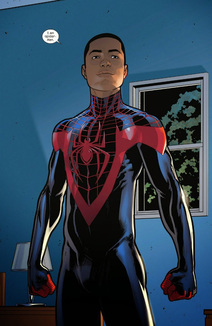 by Preston Tolliver Earlier this weekend, Marvel Studios President Kevin Feige announced that Peter Parker will again be behind the mask of Spider-Man, silencing a Twitter movement that pushed for the next film's producers to branch out and bring Miles Morales -- an African American Spider-Man in the Marvel Ultimate Universe -- to the big screen. However, with the announcement, writers also didn't dispel the possibility of a nonwhite Spider-Man, and, as people on the Internet are wont to do, they made their voices heard, some showing disappointment at the thought of another Spider-Man portrayed by a white man, while others reveled in glee over the thought of Spider-Man continuing to look similar to how he's been drawn for 50-plus years. While some gave sincere reasons for their wishes for the next film, others used the opportunity to highlight not only their own discrimination, but the limitations that discrimination has placed on filmmakers. Film adaptations of comic book characters have always come with a little bit of a handicap. When a book goes to the big screen, the casting directors are afforded some creative leeway. Books oftentimes give vivid descriptions of their characters, but what those characters actually look like are up to the reader. Comic books don't allow that. Artists imagine those characters so we don't have to, and any change to those depictions are sometimes met with cooperation, trust and anticipation; however, too often those changes are met with a resistance, treated as sacrilege. We saw it when Thor was written as female, when Michael B. Jordan was cast as Johnny Storm, and many have taken to their keyboards to slam any notion that the next Spider-Man could be anything but nonwhite (although, for every person who's taken arms against the idea of a black Spider-Man, there's been at least one person to stand for it). Oddly, we didn't see this sort of revolt to change with previous reproductions -- I remember when Michael Clarke Duncan was cast as the Kingpin in 2003's Daredevil, and although Clarke Duncan's appearance varied drastically from the comic book's stout Caucasian, it wasn't met by an army of fans mistaking inclusion in casting for an overreach of political correctness (though to be fair, the Kingpin was only a supporting character in what is easily one of the top three worst comic book movies of all time), nor was there much uproar when the Marvel Ultimate Universe re-imagined Nick Fury as a black man (probably because no one liked the thought of living with Samuel L. Jackson's foot permanently inside them had they actually said anything). Marvel, if you actually look at it, has a history of shaking things up and has throughout the years become increasingly inclusionary. It's only recently they've begun to rewrite lead characters to be different genders or races rather than just creating new characters altogether (such as Morales, for example). Obviously, social media plays a large part in backlash Marvel has seen the last few months: everyone has a voice, and no matter how irrelevant or thoughtless what they're saying may be, they're still able to say it as loud and as much as they want. The Internet is a very loud place, and as history will tell you, those who are angriest always have the most to say. Still, it's hard to believe changes made even five years ago would be met with the hostility they are today. In reality, we've become spoiled by the comic book films we've looked forward to every summer for the last decade. The movies have consistently given us onscreen adaptations that look almost just like the characters in the comic books -- Robert Downey Jr., Chris Evans and Chris Hemsworth are almost spitting images of the characters they portray -- and it's not an experience many are willing to give up soon. Side note: For hundreds of years, Jesus Christ has been portrayed as a white man, despite having a Middle Eastern background. Surely Michael B. Jordan can be the Human Torch for one movie. I digress. All that out of the way, the saddest part of the hateful tweets and Facebook posts isn't the level intolerance that floods Twitter and Facebook any time someone is rumored to be considered for a role that doesn't fit the exact portrayal in the books, it's that after decades -- some as far back as half a century -- so many characters are defined by their physical attributes rather than what they represent. As Amazing Spider-Man and Silver Surfer writer Dan Slott said on Twitter the other day: Spider-Man is for everyone. Spidey is for any kid who ever felt like an outsider. No matter your race, creed, color, or religion. Be nice. Spider-Man isn't about a white man swinging from lamppost to lamppost fighting guys with eight arms or goblin masks, but a teenager fighting for a purpose, just like the Incredible Hulk isn't so much about a giant green man tearing through buildings and yelling simple rhetoric as it is a man whose uncontrollable emotions lead to destructive behavior. Sure, sometimes cultural identity is part of the fabric of a superhero. Take the Black Panther, for example, a Wakandan chief in Africa -- it wouldn't geographically make sense to make him anything but African. But for other characters, particularly American ones, a door is swung wide open -- just as the country is a melting pot, so should be the heroes we revere. So many of Marvel's heroes are -- and should be -- about character traits, relatable to readers of all races, genders and creed, and not limited to the color of their skin or what hangs between their legs. What's most important about so many of these characters isn't who the person is beneath the mask, but who they are beneath their skin.
0 Comments
Leave a Reply. |
Archives
July 2024
|